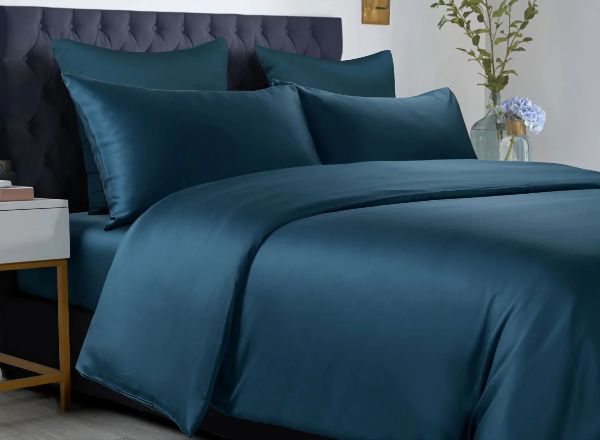When it comes to selecting the perfect bedding, the choice of fabric is essential for a comfortable and rejuvenating sleep experience. Tencel and cotton sheets are two popular options that often stand out for their unique qualities.
In this blog post, we will delve into the crucial aspects of tencel and cotton sheets, exploring factors such as fabric composition, breathability, sustainability, durability, and maintenance. Armed with this knowledge, you’ll be well-informed to make an educated decision and indulge in a luxurious slumber.

Table of Contents
Fabric Composition
Cotton sheets are crafted from natural fibers obtained from the cotton plant, renowned for their breathability, softness, and ability to regulate temperature. On the other hand, Tencel sheets are made from a fabric called lyocell, derived from wood pulp, typically sourced from sustainably managed eucalyptus trees. This semi-synthetic fabric boasts excellent moisture-wicking properties and a silky-smooth texture, rivaling the luxurious feel of high-quality cotton sheets.
Breathability and Comfort
Both Tencel and cotton sheets offer commendable breathability, keeping you cool and comfortable throughout the night. Cotton’s natural fibers allow for proper air circulation, preventing overheating and moisture build-up. Similarly, Tencel’s lyocell fibers possess excellent moisture absorption properties, dispersing sweat away from the body and facilitating evaporation, resulting in a dry and comfortable sleep environment. The silky texture of Tencel sheets can provide an extra touch of luxury and a gentle caress against the skin.
Sustainability
Tencel sheets have gained popularity due to their eco-friendly production process. The production of Tencel involves a closed-loop system, where the solvent used to process the wood pulp is recycled and reused, minimizing waste and environmental impact. The eucalyptus trees used in Tencel production are grown sustainably, requiring less water and land compared to conventional cotton farming. Cotton, although a natural fiber, can have varying sustainability practices depending on cultivation methods, water usage, and chemical treatments.
Durability and Maintenance
Cotton sheets are renowned for their durability and longevity, with high-quality options lasting for years with proper care. Cotton can withstand frequent washing, maintaining its shape and integrity over time. Tencel sheets, while generally durable, may be more susceptible to wrinkling and may require more delicate care to preserve their luxurious texture. Following the manufacturer’s instructions for washing and drying is crucial for maintaining the quality and longevity of both Tencel and cotton sheets.
Price Range
Cotton sheets are available in a wide price range, depending on factors such as thread count, weave, and quality. Higher thread count cotton sheets, such as Egyptian or Pima cotton, often come at a higher price point but offer exceptional softness and durability. Tencel sheets are generally considered a luxury option and may be priced slightly higher compared to regular cotton sheets. However, the benefits of Tencel, such as its silky texture and sustainable production process, make it an appealing investment for many.
Conclusion
When choosing between Tencel and cotton sheets, consider your personal preferences and priorities. Cotton sheets offer a classic choice, renowned for their breathability, comfort, and durability. On the other hand, Tencel sheets provide a luxurious feel with excellent moisture-wicking properties and sustainable production methods.
Evaluate factors such as breathability, sustainability, durability, and maintenance to make an informed decision that aligns with your sleep needs and values. Investing in high-quality sheets, regardless of the material, is essential to ensure a restful and indulgent slumber.

Alex P. Davis has a BA in Interior Design from The New York School of Interior Design and 10 years of experience expertly designing sophisticated interiors.
